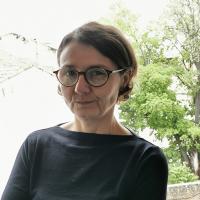
Society and regional strategies 5 min
Yuna Chiffoleau, the long and short of short distribution channels
Yuna Chiffoleau is a research director in sociology in the Science for Action and Development Division of INRAE (formerly INRA). Specialising in economic sociology and networks, she is particularly interested in short food distribution channels, and committed to measuring their impact on growers and consumers.
Published on 27 June 2016
Measuring the economic and social impact of short distribution channels
Yuna’s motivation in becoming an engineer specialising in tropical agronomy is to help people in developing countries get ahead. With several degrees under her belt, she headed for West Africa and Vietnam, and came to the conclusion that it’s pointless to propose turnkey technical solutions to help a society develop without taking the social dimension into account. That is why, upon returning to France, Yuna hit the books again, this time to study sociology. Her doctoral thesis involved working closely with representatives in the wine industry, where there is growing concern over the difficulties of transitioning from mass production to small-scale, high-quality production - a major change that reshaped the industry at the end of the 1990s. Yuna met with these vulnerable populations the better to understand their situation, with a view to developing new and innovative group projects that they could be a part of. That is when she realised that the cooperative model was being called into question, and started proposing ideas to restructure it, “based on the ideas of those whose voices are not heard at General Assemblies”. When Yuna joined INRA as a researcher in sociology in 2001, her mind was made up: “I wanted to be a part of the innovative collective action of local groups while making sure that those previously excluded from development processes fully found their place”.
Working with vulnerable farmers
Yuna continues to follow closely the changes happening in France’s rural Languedoc region, and pays particular attention to those who have abandoned traditional distribution channels in favour of selling their products themselves, not only to boost their income, but to restore their dignity as growers. A similar shift is happening with INRA researchers in biotechnical sciences, within the framework of their work on participatory selection for organic farming. In Yuna’s own words, “From 2005, I became interested in assessing how direct sales and short distribution channels can help protect agriculture from economic and social duress”. She focussed her research on vegetable cropping, a sector suffering from a high rate of growers in difficulty, but that has also given rise to innovative group projects. Working hand in hand with regional players and the Ministry of Agriculture, her goal is to gain a better understanding of how these distribution channels can help growers both economically and socially, while still responding to the changing expectations of consumers.
Short distribution channels: easing the transition to more sustainable food systems
For Yuna, short distribution channels, between markets and social innovation, provide an opportunity to reflect upon core socio-economic issues. By revealing profound changes in food systems - urban ones in particular - they are also an effective way to ease the transition toward more sustainable food systems. Since last year, Yuna has helped run the joint technological network Local Food, which seeks to bring together players involved in developing channels that put growers and consumers in touch, while acknowledging and supporting the intermediaries who support local agriculture. In this role, she and one of her doctoral students are studying to what degree farms that are involved in short distribution channels are changing their modes of production in favour of greener agricultural methods. But Yuna is also interested in consumers, and not just those who are already converted: “I want to evaluate if and how these new practices raise awareness of environmental and economic issues, and whether they encourage people to change their food habits in favour of more sustainable development”. And to do so, she runs experiments similar to the one in the town of Grabels, where a short-distribution market with labels to indicate the origins of produce was set up to raise awareness. The project, which led to INRA’s first collective brand, Ici.C.Local (Here, it’s local), has spread to other places. In addition to this work, Yuna dedicates a lot of time to teaching, which goes hand in hand with her research: “I am very serious about helping the agronomists of tomorrow understand how much their decisions will have consequences in society”.
- 42 years old
- Engineering degree in Agronomy from the Higher Institution for Agricultural Sciences (Agrocampus Ouest) in Rennes, 1996.
- Engineering degree in Tropical Agronomy from the Higher National Centre for Studies in Agronomy for Hot Climates in Montpellier, 1997.
- Higher degree in “Environment, Time, Space, Societies”, University of Orléans – AgroParisTech, 1997.
- PhD in Sociology, University of Paris 5, 2001.
- Experienced INRA Research Scientist (CR1) in Sociology – Science for Action and Development (SAD) Division, Joint Research Unit Innovation and Development in Food and Agriculture (UMR 0951), since 2001.
- Teacher, Researcher & Consultant in Montpellier SupAgro (2005-2015).
- Research Director (2018)
